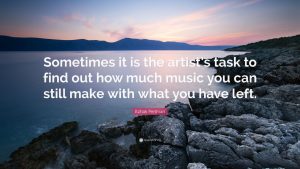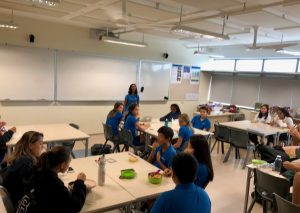 In my previous life, I was a creative writer for Manila’s leading (arguably #1) ad agency.
In my previous life, I was a creative writer for Manila’s leading (arguably #1) ad agency.
I was young, vivacious, and passionate. I did not suffer fools. And I thought I was the best thing since sliced bread.
But eventually, I became less young. And became more patient. Which allowed me to gain wisdom from those I once dismissed as fools. And eventually, realised that there was nothing impressive about sliced bread.
And so, waking up to a brand new understanding of myself, I course-corrected and took on a new identity. From Writer Nessa to Teacher Nessa (as my dear friends from the agency put it).
But I was (and still am) more Jekyll/Hyde than Superman/Clark Kent. I don’t bother to hide my other identity. And many a times, my other persona comes for a visit to help with lesson planning, writing workshops, and the like. (She is surprisingly absent for marking papers, though!)
So when Tiffany Shlain shares her creative process, Writer Nessa had plenty to say. First of all, she’s a huge fan of the Webby Awards and can’t believe she hasn’t seen this video before. She agrees that being a creative writer is not for the faint of heart. And she does wish she knew back then when to say “I’m done.”
Teacher Nessa nods sympathetically at this, yet another burst of old-diva nostalgia. But she pats Writer Nessa’s faux-fur-lined robe and consoles her by saying that the process is still very much alive in her and around her. Surely, the creative process is the learning process. And this video is good reminder of what the students go through. The classroom is the creative floor, but instead of creating ads, we are creating the future.
Shlain talks about about the first three steps of starting on a hunch, brainstorming, and soaking information. The easy part. A hunch is neither right nor wrong. Brainstorming clarifies thinking. Soaking up information is but passive listening. This sounds very much like the first week of school. Or the first few weeks of a new lesson. Everyone knows the drill.
But then comes the building stage. Turning the hunch into a reality. Putting words onto a page. Committing to a path for a project. The build stage is scariest to start, but once momentum is there, very difficult to leave. The constant editing, perfecting, last-minute addition has a giddying effect. For the student, it is the work in the classroom – it is so much fun working with peers and with the teacher at your side.
Then, you have to go home. And then confusion, darkness, fear seats in. Here come the panicked e-mails:
“What was it that you said in class, Ms…?” asks a student who had left the classroom with so much confidence. And worse, the weaker ones e-mailing at midnight: “I don’t think I can submit this on time, Ms.”
I admit, the e-mail I want to write but catch myself deleting sort of sounds like: “Are you kidding me???”
In retrospect, though, as full grown adults, we were guilty of the same thing. We would call the account management team to clarify:
Creatives Team: Does the client really want this in the ad…?
Accounts Team: Well, yes, did you not read my contact report?!
And, of course, that horrible meeting five minutes before we present to client:
Creative Director: I don’t think the team is ready yet, we might need to cancel the meeting.
Accounts Director: *many, many loud and angry words not fit for publication*
When I have my A-game on, I take on the voice of the fatherly Accounts Director walking me off the ledge and saying: “Just present what you have so far. I’m sure it will be fine.”
And eventually the student submits. And here’s the crucial part: tell them to let it go.
Easier said than done with digital submissions these days. But so very important. Downtime is prime time. It is when the brain breaks off any emotional connection to the original ideas written on paper and suggests an alternative. More often than not, a truly groundbreaking alternative.
And usually, what prompts this new connection is the feedback/WiP meetings (stage 7 if you’ve been counting). The most important thing to highlight here is that it IS WiP: work in progress. Yes, do the love sandwich, they need it. They need to know the feedback is for the work, and the work is not a reflection of who they are. It is a reflection of the work… so far.
No matter how gently you do it, though, this feedback process isn’t always free of drama. And, I think, there’s no reason for it NOT to be dramatic. Just as they say about truth, for the feedback to set them free, it should truly anger them first. They should come out of that session saying: “Oh yeah??? Well there’s plenty where that came from. I’ll show you! I’ll show you how fantastic I can be.” I think a little anger, well-placed, and well-managed goes a long way.
The eighth and ninth stages are much gentler. The light bulb moment. Mind blown. They get it now. And they will get many more things as they review and reflect. Reflection time is so soothing. The mind makes a narrative of this very messy process and assures them that everything fell in place in the end.
The last step? Know when your job is done. For Teacher Nessa, it is much easier to know this. It is when we finally launch them to the next grade level or to the world.
Where they become your Facebook friend or Twitter follower. And you find out about that scholarship they were granted. The success of their business venture. The birth of their first child.
The creative process is the process of ultimate vulnerability. It is much like that apocryphal (in fact, already disproven) yet wonderful piece of modern mythology: Itzhak Perlman, god of the Stradivarius, breaks his violin string mid-performance. A collective gasp and pearl-grasping from the audience. But, instead of walking off-stage, he continues to play and produces the most magnificent music of his whole career.
When he finishes, he leaves the audience with these words: “Sometimes it is the artist’s task to find out how much music you can still make with what you have left.”
The learning process is no less daunting. It is trying to finish that obra maestra in front of everyone – not just everyone, your peers! – while impossibly high expectations snaps your metaphorical violin strings.
It is the teacher’s task, I believe – especially in that fifth stage of darkness, doubt, and confusion – to say: “Actually, I believe you have so much music still. Keep on playing.”
And so, when they finally finish the masterpiece that is their education, is it any wonder that we, as teachers, are always the first one to give a well-deserved standing ovation?












